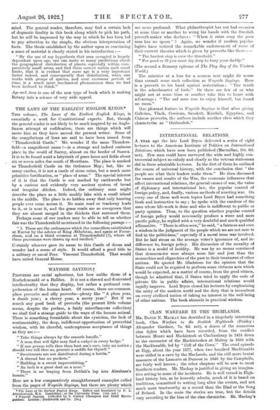TIME THE LEVELLER.* THEORIES, like organisms, are no sooner firmly
established than the process of decay sets in. Immediately the chain-mail of Huxley's oratory was removed from the body of the theory of evolution, the critical barbs of time and speculation found their way into the weak spots. At the time of its coronation, after it had been clamant in vain for two thousand years, this wonderful explanation of the vicissitudes of organic, aye, and even psychic, life was claimed by a generation of enthusiasts to be final. But, by its denegation of the possibility of finality, it held within itself a truth which the generation was incapable of appreciating ; for in those days finality was an axiom at the base of all human thought. The theory of evolution—like many other mighty prophets—was a warning to its own followers, and in our day we see that warning being justified. Flagrant sceptics, such as the naturalist Richard Jefferies, and many of the Victorian ecclesiastics, are now no longer looked upon as bigoted fools, and the bases for speculation afforded by their nonconformity are as welcome as the most orthodox developments of the great theory.
But notwithstanding our latter-day divagations, the principle of the laws foretold by the Greeks, further adumbrated by Leonardo da Vinci, Herder, and Goethe, and clearly exposed by Darwin, is establishing itself in all branches of knowledge. It has become a subconscious assumption of the mind in dealing with all art, all science, and all mechanics.
In Age and Area, the result of twenty years of careful com- pilation of statistics, the author has established, we think convincingly, some interesting modifications of the theory of Natural Selection in relation to plant life. These modifications are characteristic products of the modern scientific mind, which has a tendency to suspect the theoretical and complex approach to life peculiar to the earlier experimenters who still wore the habits of the philosophic savants. Nowadays " specu- lation " is being displaced by "statistics,", the new method implying perhaps a more humdrum routine, but leading to results far more subtle and sensitive to readaptation ; results, in consequence, far more elusive of the imagination of the lay ! Age and Area. By J. C. Willis, F.R.S. Cambridge : at the Press. [146:3
mind. The general reader, therefore, may find a certain lack of dogmatic finality in this book along which to pick his path, but he will be impressed by the way in which he has been led to pay attention to the simple, the obvious interpretation of facts. The thesis established by the author upon so convincing a mass of material is clearly stated in his introduction :— " By the use of my hypothesis that area occupied is largely dependent upon age, one can make so many predictions about the geographical distribution of plants, especially within com- paratively small areas, and find them correct within such small limits, that it is evident that mere age is a very important factor indeed, and consequently that distribution, when one works with groups of species, and over enormous periods of time, is a much more mechanical phenomenon than we had been inclined to think."
Age and Area is one of the new type of book which is making Botany into a science of very wide appeaL



































 Previous page
Previous page